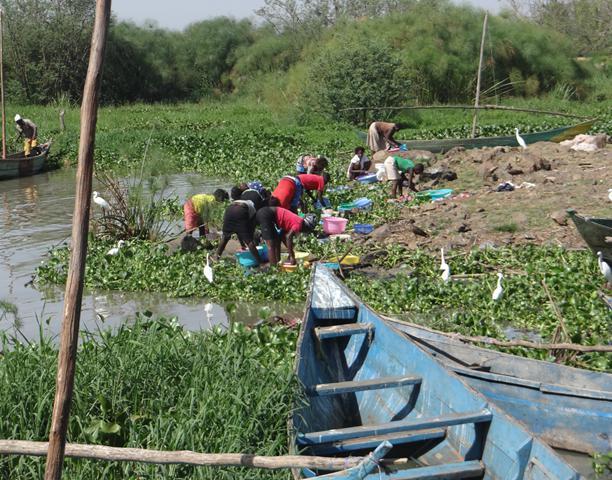Faith Chesire
Other projects
3 Oct 2017
Towards Landscape Connectivity Enhancement for the Conservation on African Clawless Otter (Aonyx capensis) in Nyando Wetland, Kenya
This study will determine what knowledge about and attitudes toward the African clawless (Aonyx capensis) otter amongst local communities for its conservation.

Women cleaning Haplochromine ssp (fulu) fish by the banks of river Nyando.
Otters are poorly known species in most parts of Africa especially in Kenya. This is due to the specificity and low accessibility possibilities of their habitat and the lack of specific census methods. Past observations (not scientific) has shown that:
(i) Human – otters’ conflicts are the major factors which explain threats on wetlands and affect otter’s survival;
(ii) African clawless otter (Aonyx capensis) is now highly endangered in Kenya’ wetlands.
Conservation awareness among the local communities is low particularly with regards to importance and values of otters. They destroy fisheries traps and gears and reduce quantitatively and qualitatively fishermen harvests. Local communities developed and improved each year many little selective hunting techniques, increase pollution of water points and over- exploited wetlands resources to struggle against otter’s damages.
Likewise, there has been no major investigation on the status and distribution of otter species in Kenya. Our study will determine:
(i) what knowledge about and attitudes toward the African clawless otter and its conservation local communities have,
(ii) whether their knowledge and attitudes are related,
(iii) whether there are any significant differences in attitudes and knowledge with respect to gender/age hence develop conservation measures to the protection of otter’s in-situ.
This study will improve the status of otters and their habitat by building public understanding and support throughout all segments of society within the project area while the results of the, field interviews and monitoring program will enhance the possibility to obtain reliable knowledge about the habitat requirements of the otters and detect early special needs for habitat restoration and otter conservation. Furthermore, the research methods will reduce the uncertainty of the results from habitat restoration and awareness creation and conservation management of otters in Nyando Wetland which is not formally protected as important habitat to important bird Area (IBAs) and provide planning for policy management infrastructure for Nyando Wetland.